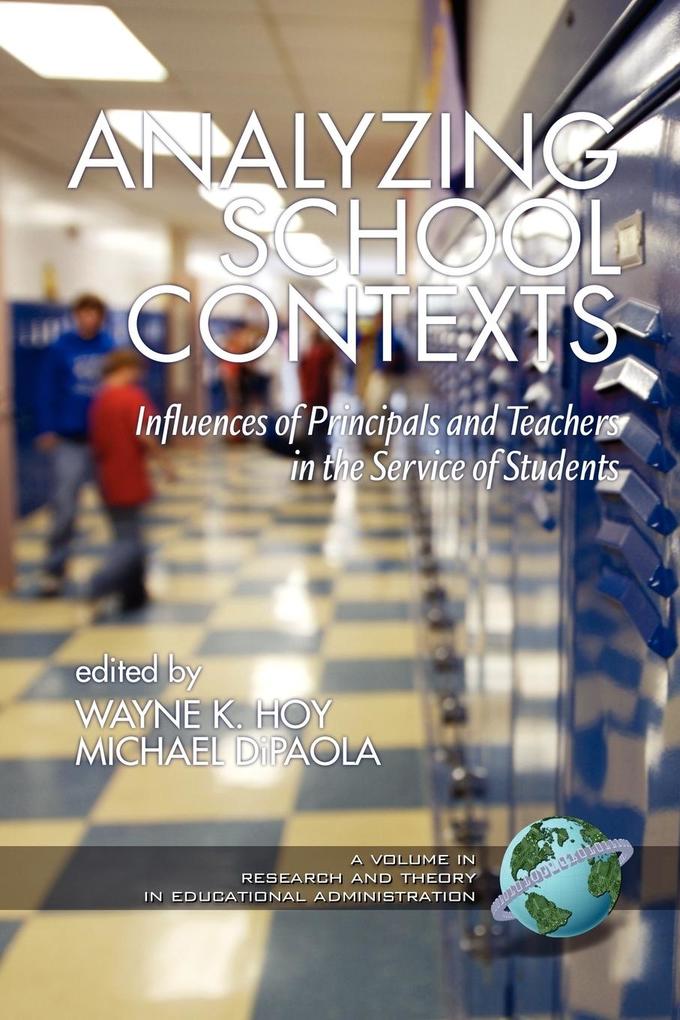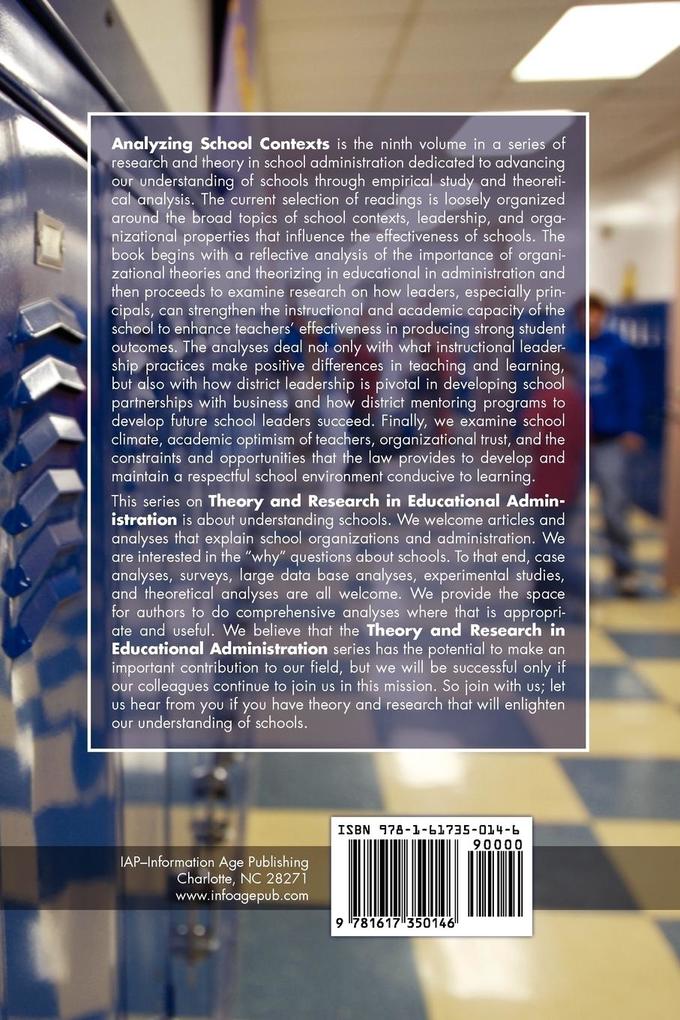
Zustellung: Mo, 05.05. - Do, 08.05.
Versand in 6 Tagen
VersandkostenfreiBestellen & in Filiale abholen:
A volume in Research and Theory in Educational Administration
Series Editors: Wayne K. Hoy, The Ohio State University
and Michael DiPaola, The College of William and Mary
Analyzing School Contexts is the ninth volume in a series of research and theory in school administration
dedicated to advancing our understanding of schools through empirical study and theoretical analysis.
The current selection of readings is loosely organized around the broad topics of school contexts, leadership,
and organizational properties that influence the effectiveness of schools. The book begins with a reflective
analysis of the importance of organizational theories and theorizing in educational in administration and then
proceeds to examine research on how leaders, especially principals, can strengthen the instructional and academic
capacity of the school to enhance teachers' effectiveness in producing strong student outcomes. The analyses deal not only with what instructional
leadership practices make positive differences in teaching and learning, but also with how district leadership is pivotal in developing school
partnerships with business and how district mentoring programs to develop future school leaders succeed. Finally, we examine school climate, academic
optimism of teachers, organizational trust, and the constraints and opportunities that the law provides to develop and maintain a respectful
school environment conducive to learning.
This series on Theory and Research in Educational Administration is about understanding schools. We welcome articles and analyses that
explain school organizations and administration. We are interested in the "why" questions about schools. To that end, case analyses, surveys, large
data base analyses, experimental studies, and theoretical analyses are all welcome. We provide the space for authors to do comprehensive analyses
where that is appropriate and useful. We believe that the Theory and Research in Educational Administration Series has the potential to make an
important contribution to our field, but we will be successful only if our colleagues continue to join us in this mission. So join with us; let us hear from
you if you have theory and research that will enlighten our understanding of schools.
Series Editors: Wayne K. Hoy, The Ohio State University
and Michael DiPaola, The College of William and Mary
Analyzing School Contexts is the ninth volume in a series of research and theory in school administration
dedicated to advancing our understanding of schools through empirical study and theoretical analysis.
The current selection of readings is loosely organized around the broad topics of school contexts, leadership,
and organizational properties that influence the effectiveness of schools. The book begins with a reflective
analysis of the importance of organizational theories and theorizing in educational in administration and then
proceeds to examine research on how leaders, especially principals, can strengthen the instructional and academic
capacity of the school to enhance teachers' effectiveness in producing strong student outcomes. The analyses deal not only with what instructional
leadership practices make positive differences in teaching and learning, but also with how district leadership is pivotal in developing school
partnerships with business and how district mentoring programs to develop future school leaders succeed. Finally, we examine school climate, academic
optimism of teachers, organizational trust, and the constraints and opportunities that the law provides to develop and maintain a respectful
school environment conducive to learning.
This series on Theory and Research in Educational Administration is about understanding schools. We welcome articles and analyses that
explain school organizations and administration. We are interested in the "why" questions about schools. To that end, case analyses, surveys, large
data base analyses, experimental studies, and theoretical analyses are all welcome. We provide the space for authors to do comprehensive analyses
where that is appropriate and useful. We believe that the Theory and Research in Educational Administration Series has the potential to make an
important contribution to our field, but we will be successful only if our colleagues continue to join us in this mission. So join with us; let us hear from
you if you have theory and research that will enlighten our understanding of schools.
Produktdetails
Erscheinungsdatum
01. April 2010
Sprache
englisch
Seitenanzahl
300
Herausgegeben von
Michael Dipaola, Wayne K. Hoy
Verlag/Hersteller
Produktart
kartoniert
Gewicht
459 g
Größe (L/B/H)
234/156/16 mm
ISBN
9781617350146
Entdecken Sie mehr
Bewertungen
0 Bewertungen
Es wurden noch keine Bewertungen abgegeben. Schreiben Sie die erste Bewertung zu "Analyzing School Contexts" und helfen Sie damit anderen bei der Kaufentscheidung.










